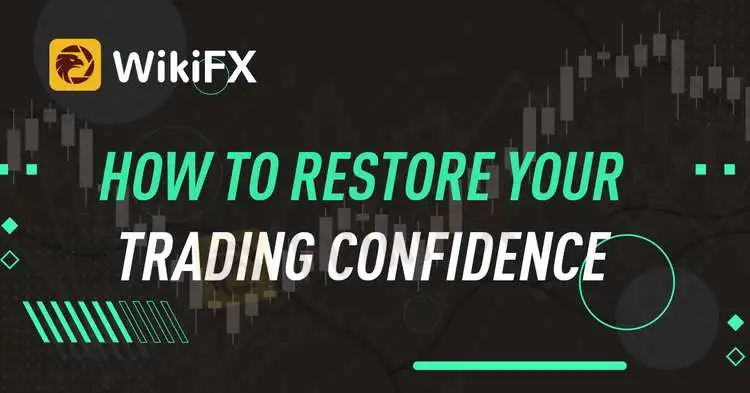简体中文
繁體中文
English
Pусский
日本語
ภาษาไทย
Tiếng Việt
Bahasa Indonesia
Español
हिन्दी
Filippiiniläinen
Français
Deutsch
Português
Türkçe
한국어
العربية
HOW TO RESTORE YOUR TRADING CONFIDENCE
Abstract:Confidence is the most important aspect of trading, it is necessary for every trader to have that irrespective of the loss incurred on any transaction made. Following a significant loss, one's confidence may be shaken. Of course, there are several reasons why traders lose money, including a lack of market understanding, a bad risk management approach, or making trading decisions based on emotions, whether greed or fear. However, when a trader loses confidence, it may have a significant impact on their trading success. So, how can you keep your confidence up even when you're on a losing streak?

If the markets have shaken your confidence, here are three easy measures you can do right away to re-establish your trading confidence and get back on track.
Accept Accountability for Your Trades
However, when things go wrong, you must accept responsibility and try to determine what may have been done better to avoid such a loss. Consider where you went short. For example, did you take too many chances? Was the transaction carried out as planned? Or did you allow your emotions control your business?
It's also a good idea to halt trading until you figure out what went wrong. Learning from failed trades is one of the most effective strategies to enhance your overall trading performance. Remember, if you don't have control over your trade, you can repair it. When you accept responsibility, you have control over your trade, which is precisely what you desire.
Concentrate on a Sound Trading Strategy
Get back to fundamentals if you've suffered a significant loss. Concentrate on your trading strategy (including any adjustments) and its implementation. A sound trading strategy distinguishes successful traders from others. Before returning to trading after a loss, you should have a complete trading strategy in place that takes into account your trading style and risk tolerance levels.
Your approach must also incorporate effective risk management strategies. After all, without an appropriate risk management approach, a trader who has made profits might lose it all in only one or two poor trades.
Losses should not be taken personally.
Losses are unavoidable in trading. A successful trader is one who can remain calm in the face of a loss. By maintaining energy and resilience, you may avoid taking losses personally and so become a better trader.
However, if your trade lacks drive, you will be upset after a loss. As a result, your ability to make sound and objective trading decisions suffers, and you must either take vengeance trades or leave. Analyzing the results, evaluating the trade setup, and identifying what went wrong is a great way to deal with losses.
In conclusion
When your trading strategy is strong, well-thought-out, and aligned with your goals and risk tolerance levels, you will feel fairly confident and safe in your trade. Also, keep in mind! Losing money is not the end of the world. To be successful in trading, you must be willing to accept the risk of accepting any risk that comes your way

Disclaimer:
The views in this article only represent the author's personal views, and do not constitute investment advice on this platform. This platform does not guarantee the accuracy, completeness and timeliness of the information in the article, and will not be liable for any loss caused by the use of or reliance on the information in the article.
Read more

The Hidden Checklist: Five Unconventional Steps to Vet Your Broker
Forex broker scams continue to evolve, employing new tactics to appear credible and mislead unsuspecting traders. Identifying these fraudulent schemes requires vigilance and strategies beyond the usual advice. Here are five effective methods to help traders assess the legitimacy of a forex broker and avoid potential pitfalls.

Pros and Cons of Choosing Unregulated Forex Brokers
Discover the pros and cons of unregulated forex brokers, explore risks, benefits, and key features, and learn how to evaluate their credibility with the WikiFX app.

5 Questions to Ask Yourself Before Taking a Trade
Before executing any trade, traders should pause and ask themselves critical questions to ensure they are making rational and well-informed decisions. Here are five questions to help you reflect on your strategy, manage risk, and control emotions before entering the market.

The Psychology of Investment Scams: Understanding Why Victims Fall Prey
Investment scams have become increasingly sophisticated, preying on human psychology to exploit vulnerabilities. While these fraudulent schemes promise extraordinary returns, they often rely on psychological tactics to deceive victims. Understanding these factors can help traders recognise and avoid falling for scams.
WikiFX Broker
Latest News
ASIC Sues Binance Australia Derivatives for Misclassifying Retail Clients
WikiFX Review: Is FxPro Reliable?
Malaysian-Thai Fraud Syndicate Dismantled, Millions in Losses Reported
Trading frauds topped the list of scams in India- Report Reveals
YAMARKETS' Jingle Bells Christmas Offer!
AIMS Broker Review
The Hidden Checklist: Five Unconventional Steps to Vet Your Broker
WikiFX Review: Something You Need to Know About Markets4you
Revolut Leads UK Neobanks in the Digital Banking Revolution
Fusion Markets: Safe Choice or Scam to Avoid?
Currency Calculator


